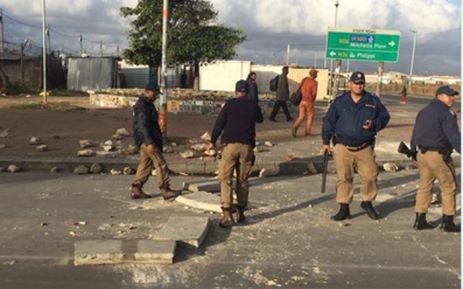The City of Cape Town will be dealing with an estimated R18 million worth of damages due to the protest action after metro police managed to get a volatile service delivery protest under control by Marikana and Lower Crossroads residents in Phillipi East. The protests resulted in malicious damage to property causing a delay on service delivery.
“They fought over land wanting proper housing and access to resources such as electricity and water. However, them destroying infrastructure such as a waste depot is self-defeating as it slows down service delivery. Other vehicles can only be used to extent until it causes inconvenience,” says Mayoral committee member of safety and security, Alderman JP Smith.
Violent protesters took to the streets and butchered existing infrastructure, burnt down two houses and trashed the Klipfontein Solid Waste Depot facilities and all its six operating vehicles.
“Residents threatened the life of a security guard after they set buildings and vehicles on a light,” says Smith.
The protest was sparked by illegal Marikana and Crossroads illegal informal settlers taking to the street looting property and infrastructure.
“24 to 30 shacks were destroyed and more houses. Amongst these houses was the house of ANC councilor Mzuzile Mpondwana which was tortured. The two groups dispensed illegal firearms and detonated petrol bombs leaving the area in ruins,” says Smith.
The protest began at the Klipfontein Solid Waste Management Depot in Phillipi on Wednesday and ended on Sunday afternoon after police enforcement and security were deployed in the area
The New Age reported that the riots claimed two lives while 10 people were arrested for public violence.
“We hope these people are charged and that they are held accountable because the next time they have their way they will resort to the same violence,” says Smith.
The City says it cannot provide these informal residents with access to sanitation, water and electricity.
“We cannot provide these people with basic resources as they invade private property,” says Smith. VOC City of Cape Town will be dealing with an estimated R18 million worth of damages due to the protest action after metro police managed to get a volatile service delivery protest under control by Marikana and Lower Crossroads residents in Phillipi East. The protests resulted in malicious damage to property causing a delay on service delivery.
“They fought over land wanting proper housing and access to resources such as electricity and water. However, them destroying infrastructure such as a waste depot is self-defeating as it slows down service delivery. Other vehicles can only be used to extent until it causes inconvenience,” says Mayoral committee member of safety and security, Alderman JP Smith.
Violent protesters took to the streets and butchered existing infrastructure, burnt down two houses and trashed the Klipfontein Solid Waste Depot facilities and all its six operating vehicles.
“Residents threatened the life of a security guard after they set buildings and vehicles on a light,” says Smith.
The protest was sparked by illegal Marikana and Crossroads illegal informal settlers taking to the street looting property and infrastructure.
“24 to 30 shacks were destroyed and more houses. Amongst these houses was the house of ANC councilor Mzuzile Mpondwana which was tortured. The two groups dispensed illegal firearms and detonated petrol bombs leaving the area in ruins,” says Smith.
The protest began at the Klipfontein Solid Waste Management Depot in Phillipi on Wednesday and ended on Sunday afternoon after police enforcement and security were deployed in the area
The New Age reported that the riots claimed two lives while 10 people were arrested for public violence.
“We hope these people are charged and that they are held accountable because the next time they have their way they will resort to the same violence,” says Smith.
The City says it cannot provide these informal residents with access to sanitation, water and electricity.
“We cannot provide these people with basic resources as they invade private property,” says Smith. VOC






 WhatsApp us
WhatsApp us 

